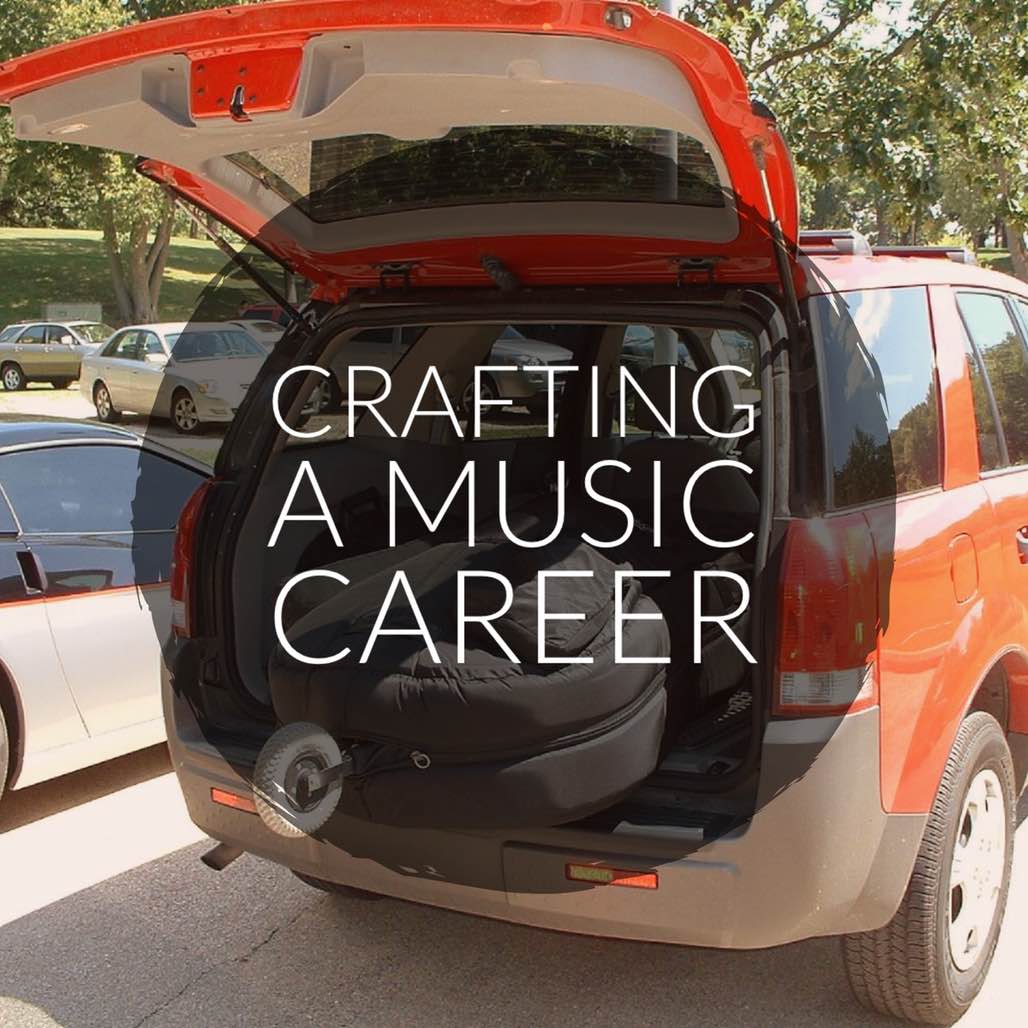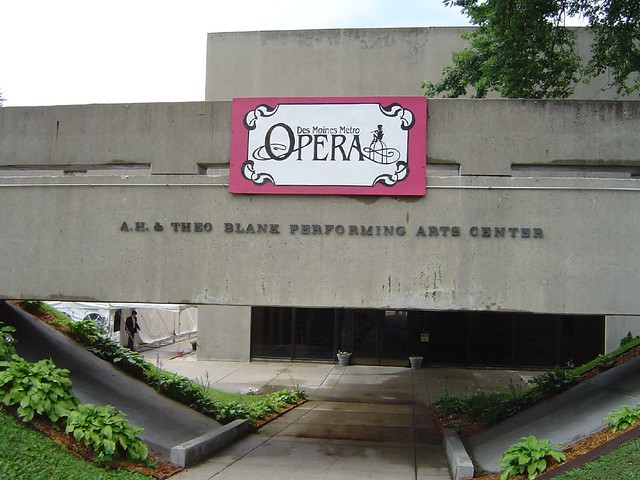 I went through music school with one goal…
I went through music school with one goal…
Get… an… orchestra job!
This was my Holy Grail. The pot of gold at the end of the rainbow.
The early part of my career is a good example of what happens with someone on that path doesn’t get an orchestra job.
This series is divided into five parts:
Part 1 – Preface: My Strange Path Through the Music World
Part 2 – Building My Freelance Career (this post)
Part 3 – How Sinking My Freelance Career Helped Me
Part 4 – Working in Education – What My Career Looked Like Right Before Bailing
Part 5 – Starting From Scratch – How I’m Building My Portfolio Career
I hope you enjoy it! Click the link below and I’ll send you more posts like this!
Piecing together a career
It wasn’t until years later that I realized how lucky I was in terms of freelancing.
Several regional orchestra positions opened up simultaneously just as I was graduating from my masters degree.
During the spring and summer of 2000, I landed the following jobs:
| Position | Approx. Yearly Salary |
| Milwaukee Ballet Orchestra | $5000 |
| IRIS Chamber Orchestra | $5000 |
| Elgin Symphony Orchestra | $6000 |
These dollar figures totaled only $16,000, which sounded disturbingly low, but I was only paying $300 a month for my apartment. I’d said to myself that if I could bring in at least $1000 a month, I wouldn’t worry about trying to get a job and would just focus on taking auditions.
I had student loans, but I deferred these and lived on a diet of peanut butter and jelly, pasta, coffee, frozen pizza, and Miller High Life. It wasn’t until my mid-30s that I started to eat a bit healthier!
The good news with those three jobs is that, miraculously, none of the weeks conflicted with each other. This was the only year in my freelance career where nothing conflicted!
I’m glad it played out that way, though. It was a calming way to start a freelance career.
Other Work
In addition to that $16,000 base, I was called as a regular sub for the musical Forever Plaid. The regular bass player had three shows per week that he couldn’t play, so I had at least three shows a week on the calendar. The pay wan’t very high, but there was a bass waiting for me at the hall and I could take the train. It sure beat working a minimum wage job!
I also got called to teach electric bass at a music school in Chicago. Again, the pay was modest but it was within walking distance of my place. Another piece in the freelance puzzle.
Finally, I had made the finals of the Grant Park Symphony that spring, which put me on some really good sub lists, so within a few months I was getting called by some of the better in-town work in Chicago.
My first freelance season (2000-2001)
I ended up bringing in about $1600 that first September, and then $2400 in October. November was around $2000, and I made over $3000 in December.
In hindsight, I realize that my move into the freelance world was really easy for me. Most people don’t land a series of gigs like I did right out of school. The pieces came together pretty well for me.
My Problem with Success
In a way, I think that my early success was a detriment.
Why?
Because I lost that hunger for more.
I was so thrilled to have an actual income that I lost the urge to take that next step.
I kept taking professional auditions, but I was weighing everything I took against staying in Chicago and freelancing. And that option didn’t seem so bad. I mean, my girlfriend (who would later become my wife) was in Chicago. Things were going well for her in school and they were about to go quite well for her on the freelance scene.
Squirreling away for the summer
After that first season of freelancing (2000-2001), I discovered one of the painful truths of the classical freelancer life: summer
Simply put, the earning potential drops off precipitously in those summer months. The regular gig seasons end. Summer gigs don’t pay as much. Students go on vacation.
That summer period often stretches into 4-5 months of underemployment or downright unemployment.
In the freelance game, it’s all about feast or famine.
Earnings for Freelance Season No 1: $36,000 minus expenses
positives:
- I surpassed my minimum (albeit poverty-level) requirement of $1000/month by 300%
- I had established a diverse set of regular gigs – if one went away, I wouldn’t lose everything
- lots of time during the day to practice
negatives:
- my nearest regular gig was 40 miles away, and my furthest was 600 miles away – lots of driving
- many months of little to no income – the need for saving during the “good months” became clear
- no assurance that I would be offered the same level of work next season
- feelings of anxiety and helplessness surrounding future employment
My Mental State
It’s amazing how clear things become in hindsight. I vividly recall how anxious I was about each coming month. OK–I had a great September…
But what about October?
I was obsessed with what others thought of me. I hoped for validation at every turn. This was subconscious, but it permeated every moment of my days.
My Freelance Orchestra Musician Mentality
Orchestra gigs became my safe zones. My gig family. The folks I hung out with.
But I was always looking to show them how great I was doing. I felt like I had to constantly prove that I was, in fact, a good player.
Good player = good person = life choice validation
“Yeah, there’s talk of [insert group I play in here] going full-time. You know, if I don’t get something else, I’ll be full-time there anyway.”
Full-time.
Those words were like magic to me. I felt like I could see a magical aura around any friend (or frenemy) of mine that landed a full-time gig. Even if that gig really didn’t pay a living wage.
They had made it.
I wanted to make it too.
I spent my first few years freelancing worrying that everything would come crashing down.
What if I looked at the conductor the wrong way? Should I smile more? Smile less? How are my pants? Are they too cool? Not cool enough?
Please think I’m important!
Ahhh, hindsight.
That phrase: please think I’m important…
That right there is toxic thinking.
Those thoughts didn’t help me in any way. In fact, they clouded my ability to absorb the great experiences that I was having.
Freelance Season No. 2 (2001-2002) – Adding teaching to the mix
Outside of some electric bass lessons, I really didn’t teach that much that first year out of school.
My teaching really ramped up my second year out of school.
This changed everything.
A colleague from my college days called me about teaching bass at his high school. I agreed and found myself with a nice studio of bassists that fall up in the suburbs.
I also got a paid principal bass position in a local community orchestra just down the road from that high school.
Working out the $$
Combined, the teaching and the community orchestra gig paid about $200 for the day. I was still living cheap in terms of rent, and I had no car payment and low overhead. I realized that this weekly pay would cover my rent and expenses if I were to live cheaply. Everything else on top was, in a sense, gravy.
Now I was adding $800 a month to my income just from teaching and that community orchestra gig. That was the equivalent of one extra week of typical work a week. And all that just for going in one day a week. How cool was that?
Also, after I adjusted to the shock of having to wake up early one day a week and go teach, I found myself enjoying the experience of working with bass students. I had several talented students even in that very first crop, and it was satisfying to watch them progress.
2001-2002 Gig Portfolio
I played the following gigs regularly that year. I also started to work for several contractors in town. The contractor work was more sporadic but paid better and was closer to home.
- Elgin Symphony
- Milwaukee Ballet
- IRIS Chamber Orchestra
- Rockford Symphony
- Lake Forest Symphony
- Chicago Philharmonic
- Chicago Opera Theater
- Grant Park Symphony
To cancel or not to cancel?
Every successful freelancer has faced this issue:
The [insert amazing group here] calls.
“Can you play next week?” they ask.
You look at your calendar.
You’re booked… but it’s the [insert amazing group here] calling!
What do you do?
Do you leave your modest but regular gig for the amazing but infrequent other gig? What are the long-term ramifications?
If only someone would invent an app that could calculate that. They’d be rich.
Actually, they wouldn’t be rich, because we’re talking about freelance musicians here. Zing! Sorry.
My personal rule was never leave anyone high and dry. If I really felt like I had to cancel gig #1 for gig #2, I’d secure a possible sub first. Then I’d call the contractor and explain the situation and that person x could play.
If it was less than a week until the gig, then I never bailed. But that was my rule. Every person and every situation is different.
Earnings for Freelance Season No.2: $43,000 minus expenses
The teaching bumped up my earnings for the year, and I discovered the power of having a consistent revenue stream from students. All of a sudden it made sense why my other freelance colleagues taught.
Figuring out the freelance formula
I discovered the power of two gigs per day. If I could get two gigs a day, I could work five or six days a week and actually have a day off.
I counted a gig as anything that brought in dollars. That included my private teaching.
A typical day would look like this:
Weekday:
- teach 3 hours: $120 (I didn’t charge much in these early days…)
- play rehearsal/concert: +/- $120
Weekend:
- gig or teach in the morning: $120
- evening gig: $120
If I could double up like that, I was making more like $240 a day. Multiply that by 5, and I was bringing home $1200 a week.
That dollar figure went up if I got better paying gigs. Also, some of my gigs paid more than that.
The flexibility of lesson income
The beauty of teaching lessons is that I had the ability to schedule them in the gig gaps. I kept a policy of “I’m flexible with you if you’ll be flexible with me.” that way, when I had a really busy gig week, I could reschedule or even cancel my students for the week.
My teaching hack: have more students than I could actually teach
I realized something early on. This might sound strange. But here’s what I realized:
It’s OK to have more students than you can actually teach
Strange concept, right? But here’s the thing.
My students would cancel lessons. They’d get sick. They’d be out of town. Unforeseen conflicts would arise.
I’d never teach all my students every week. That simply wouldn’t happen.
It’s kind of like owning too many clothes to actually fit into your closet. If all of your clothes were washed, you couldn’t do it. But some of your clothes are always dirty and in the hamper waiting to be washed. So it all works. A bad analogy perhaps, buy you know what I mean.
Freelance Season No. 3 (2002-2003) – Adding Adjunct University Teaching
I got an exciting email during the summer of 2002. One of my Milwaukee Ballet colleagues passed along the announcement of a double bass adjunct faculty position opening up at the University of Wisconsin-Whitewater. I applied for and got this position, and I was thrilled at the opportunity to get some college teaching experience on my resume.
As a freelancer, I had an inferiority complex about institutional affiliations. I didn’t like the feeling of being so unattached. I liked saying “hi, I’m Jason Heath from _____________ University!” That alone made a university gig of any sort attractive.
I threw myself into building a bass program at this school, and it was a resounding success. I went from 3 students to 11 students by the end of that first year, and I was teaching bass classes, playing recitals, and doing all sorts of things at the school.
My Crazy Schedule
For most of my time at UW-W, I sent up for one incredibly long day of teaching. At my busiest, I taught 10 1/2 hours in an 11 hour block. I used that precious half-hour off to walk to the local sandwich shop and eat my sandwich as I walked back to my office. Man, were those long days! Driving up in the Wisconsin winter snow was not a fun experience either.
This job added a solid $11,000 to my income that first year and was a core component of what I did until I made the decision quit.
Earnings for Freelance Season No.3: $56,000 minus expenses
My Final Few Years of Freelancing
I continued to freelance until 2007, when I made the decision to go back to school and do something else. My income continued to grow throughout those years, however, largely due to the following four factors:
- taking more in-town work
- eliminating low-paying contracts that locked me in schedule-wise
- raising my rates as a teacher
- attracting a higher quality of private student
I ended up making between $70,000 and $80,000 as a freelancer my final few seasons. This was before expenses, but it wasn’t a bad living for a freelance musician ten years ago.
Here’s how these factors helped to solidify my income:
1. Taking more in-town work
In a large metropolitan area, the best-paying gigs tend to be in town. The further you leave the center of the city, the worse the gigs pay. You end up driving further (which costs $$) for less money… and usually with a lower-quality group!
Luck and persistence raised my “gig profile” over the years, and more in-town work came in as a result. Lyric Opera Orchestra and other such high-end sub work helped a lot. There was always the struggle of keeping my regular contracts while taking the better-paying sub work, but that’s the life of a freelancer.
2. Eliminating low-paying contracts that locked me in schedule-wise
I held onto several contracted gigs way longer than necessary. I was terrified of giving up guaranteed income.
But when I gave one of these gigs up, the next year my income was always higher.
Why?
Because those lower-income gigs limited my ability to take better work.
When you’re starting out, playing in a low-wage community orchestra or per-service gig can be a good move. But over time, these gigs can hamper your ability to move forward. I had more time to do other things when I left some of these groups, and my income and happiness levels benefited.
3. Raising my rates as a teacher
I have always undervalued myself as a teacher. It’s a complex I have. I think “I’m not worth that” and I always undercharge. Sadly, I still do that. But I’m getting better!
But when I finally did start raising my rates in Chicago, I saw the massive impact that this had on my bottom line. Multiply a rate raise of $10 over the nearly 50 students that I once taught (I’m insane, I know). Then multiply that over the weeks and months you’d be teaching them. It’s a major boost in income!
4. Attracting a higher quality of private student
After for or five years of teaching, I ended up being the private teacher for many of the top bassists in the local youth orchestras. Referrals from parents in those groups led to more students, and before long I was teaching most of the bass students in these groups.
These students were motivated. They wanted to be there. They practiced what I assigned them. They cared. They didn’t cancel.
Those are fun students! Do you notice how an hour-long lesson can feel like five minutes with a great student. Doesn’t that same hour-long lesson feel like an eternity with other students?
My studio moved more and more toward the “awesome” category. As a result, I started to love teaching more.
In fact, these positive lesson experiences were what pushed me over the edge. After years of successful freelancing, I decided to torpedo my career and totally change gears.
But that’s for next time.
Next: How Sinking my Freelance Career Helped Me…
Bass News Right To Your Inbox!
Subscribe to get our weekly newsletter covering the double bass world.







